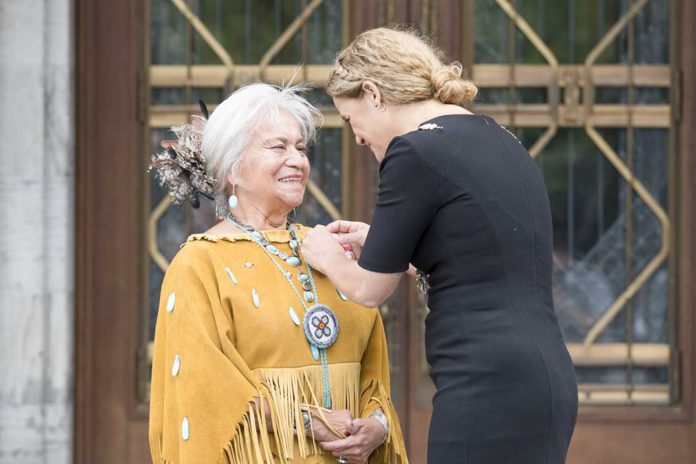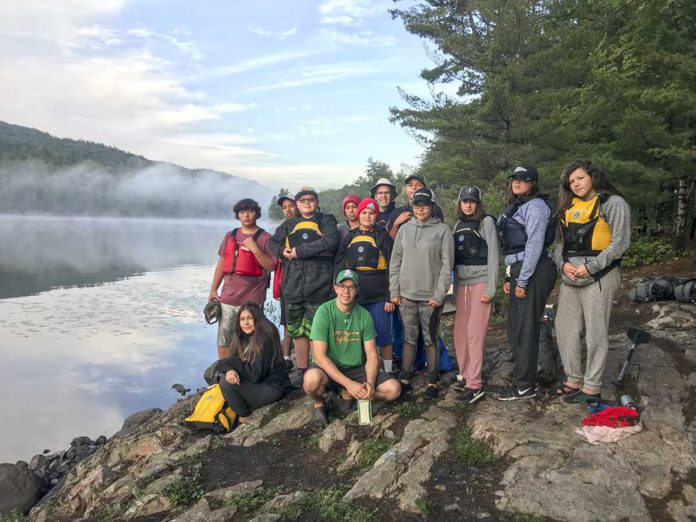Green Bay councillors pleased their appeal heard
MANITOULIN—Two Green Bay men can say they had a hand in bringing about positive change for farmers in the province following a recent exchange with Ontario Minister of Agriculture, Food and Rural Affairs (OMAFRA) Ernie Hardeman at the Association of Municipalities of Ontario (AMO) conference.
Green Bay farmers Paul Skippen and Bruce Wood attended the meeting with Northeast Town Mayor Al MacNevin and CAO David Williamson last month in Ottawa.
The farmers brought their well-documented fight with geese, Sandhill cranes and deer and the destruction of their crops, and the red tape surrounding livestock kills, to the minister, who had a sympathetic ear.
On Monday of this week, The Expositor Office received a press release from OMAFRA which states that the province “is taking immediate action to ensure the Ontario Wildlife Damage Compensation Program works as it is intended to support farmers who lose livestock to predators. This is part of the government’s mandate to cut red tape and reduce regulatory burden for businesses.”
“We heard livestock farmers’ concerns with the program so we’re making the first changes, effective immediately,” Minister Hardeman states in the press release. “We’re also continuing to consult with farmers to ensure future changes we make are meaningful and effective.”
Two changes to the program, which will apply to all claims assessed from September 4, 2018 onwards, are now in effect: The Farm Business Registration Number (FBRN) requirement has been updated to allow applicants to apply for the compensation program if they have a valid FBRN number in the current or the previous calendar year, or have a valid FBRN exemption; and the standardized pricing methodology has been updated to provide separate pricing for steers and heifers lost to predators.
Over the fall, the press release continues, Ontario will seek additional input and advice from the sector on: Introducing more ways to demonstrate that wildlife predation occurred; ensuring municipal investigators are effectively trained to assess predation; creating a separate appeals process that restores farmers’ confidence in the independence and transparency of the process; and refining the standardized pricing model to better reflect market prices.
“This government is committed to making changes that work for farmers, and we will address their concerns so the program works for farmers as intended,” said Minister Hardeman. “This is one step of many to review programs to ensure they work for the people and do not add unnecessary regulatory burdens.”
“It’s wonderful that Minister Hardeman listened to us,” Mr. Skippen said when contacted by The Expositor. “He said he would take our concerns back to the Ministry of Natural Resources and Forestry on our behalf.”
“As I said to the minister, if the government can’t afford it (paying compensation to farmers for losses) how the hell is a farmer supposed to pay for it?” he added.
Mr. Skippen said he and Mr. Wood also suggested a spring goose hunt to the minister, which they feel would greatly alleviate the problem of crop damage.
“It does sound like the Conservative government wanted to help,” Mr. Skippen continued. “The last six times we brought this forward to the government, they just sent us on a wild goose chase.”
“I’ve lost track of how many years we’ve been trying to get predator control noticed,” Mr. Wood said. “The predator issue is a big one,” he added, noting that Mr. Skippen lost a calf just a few days before. It vanished with no trace—an indicator that a bear could have taken the calf.
The damage goes beyond just having a lost animal, Mr. Wood said. The cows will often become poor-tempered with the loss of a calf and hard to control; if a bear, for instance, is hanging around, the herd will lose weight from stress; farmers will lose money on the calf-less cow, who they will have to feed for another winter before she has another calf; and so on.
“Nobody realizes the losses that we take,” Mr. Wood stressed.
Mr. Skippen said he also spoke to Doug Ford while on a campaign stop to Sudbury where he broached his concerns with livestock/crop compensation with the soon-to-be premier. “Mr. Ford said he wanted to help Northern Ontario, and in particular farmers,” he said of the brief chat.
The farmers fully believe they and the rest of the Northeast Town contingent helped to bring about change to the compensation program.
“We’ve been pushing hard for this for a long time,” Mr. Skippen said.
It is expected that a majority of program changes will be introduced in early 2019.





